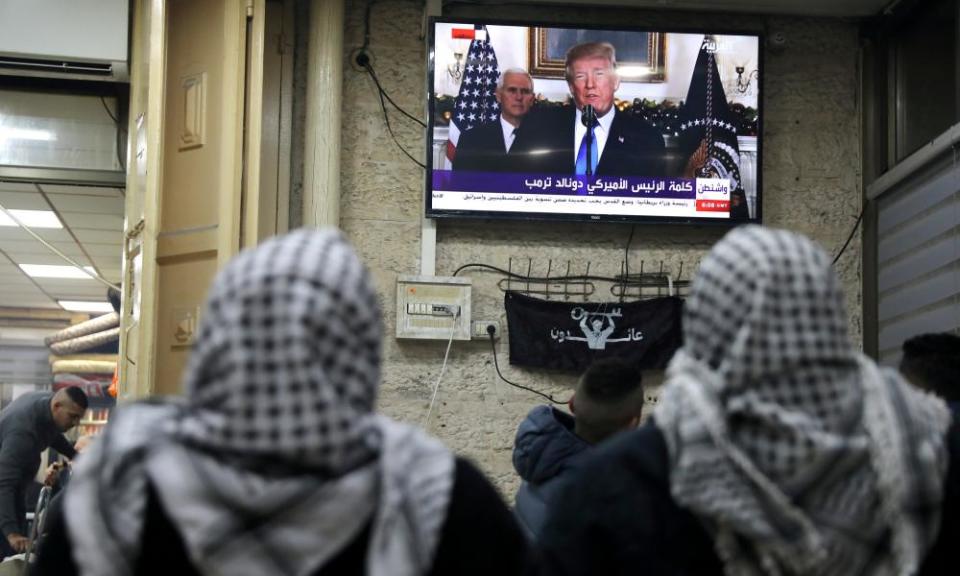What does US recognition of Jerusalem as Israel's capital mean?
Donald Trump’s abandonment of decades of US policy has set him at odds with the rest of the world and could have far-reaching consequences

In a move condemned by most of the world, Donald Trump has announced the US will recognise Jerusalem as the capital of Israel. What does his move mean for the key players?
The peace process
This has been in effect at death’s door since the former secretary of state John Kerry’s peace mission ended in failure in 2014. But the international community – apart from the US – is united in saying recognition of Jerusalem as the capital of Israel is disastrous for any hopes of reviving meaningful talks. The status of Jerusalem is one of the pivotal issues that diplomats and peacemakers have said must be agreed between the two parties in negotiations.
The Palestinians
They will see Trump’s announcement as the end of their hopes and demands for East Jerusalem as a capital of a future independent Palestinian state. Although few Palestinians want a return to violence, many will feel that diplomatic efforts have got them no closer to a state of their own and will see little alternative to direct action.
The state of Israel
The Israeli government will be thrilled. Ever since it captured (and later annexed) East Jerusalem in the 1967 six-day war, Israel has claimed the city as its “eternal and undivided” capital, and has longed for international recognition. Trump’s decision will reinforce the view of many Israeli politicians that there is little to be gained by negotiating with the Palestinians. Some 200,000 Israelis living in settlements in occupied East Jerusalem, illegal under international law, will also celebrate.
The region
Trump’s move will further destabilise an already volatile region. The powerful Turkish president, Recep Tayyip Erdoğan, said the US was “plunging the region and the world into a fire with no end in sight”. Turkey hinted it might cut diplomatic ties with Israel if the plan goes ahead. Saudi Arabia – an important ally of the US in the region – believe the move damages Riyadh’s continuing efforts to rekindle a peace deal. The Arab countries that border Israel – Egypt, Jordan, Lebanon and Syria – have all condemned the move.
Europe
Most western European countries will be deeply alarmed by US recognition of Jerusalem as Israel’s capital. But a key question is whether the EU will take action, such as robustly enforcing bans on imports from West Bank settlements and refusing to deal with Israeli businesses operating in occupied territory, setting itself on a clearly differentiated course from that of the US.
Christians in the Holy Land
Patriarch Theophilos III, the Greek Orthodox patriarchate, widely seen as the most senior Christian figure in Jerusalem, and a dozen other church leaders in the Holy Land sent a letter to Trump on Wednesday warning of “irreparable harm”. His move “will yield increased hatred, conflict, violence and suffering in Jerusalem and the Holy Land, moving us farther from the goal of unity and deeper toward destructive division”, they said. Church leaders will be anxious to protect Christian sites.
The city itself
In 2015, Palestinians made up 37% of the city’s population of about 850,000. Many live in overcrowded homes and neighbourhoods, unable to get permits to build or extend buildings. Three-quarters live below the poverty line and 25% live in neighbourhoods cut off from the rest of the city by the separation barrier. It is hard to see how Trump’s move will improve conditions for them. Nir Barkat, the city’s mayor, said on Wednesday: “Here in Jerusalem and Israel we applaud the president,” and if people became violent, “they will pay a heavy price”.

